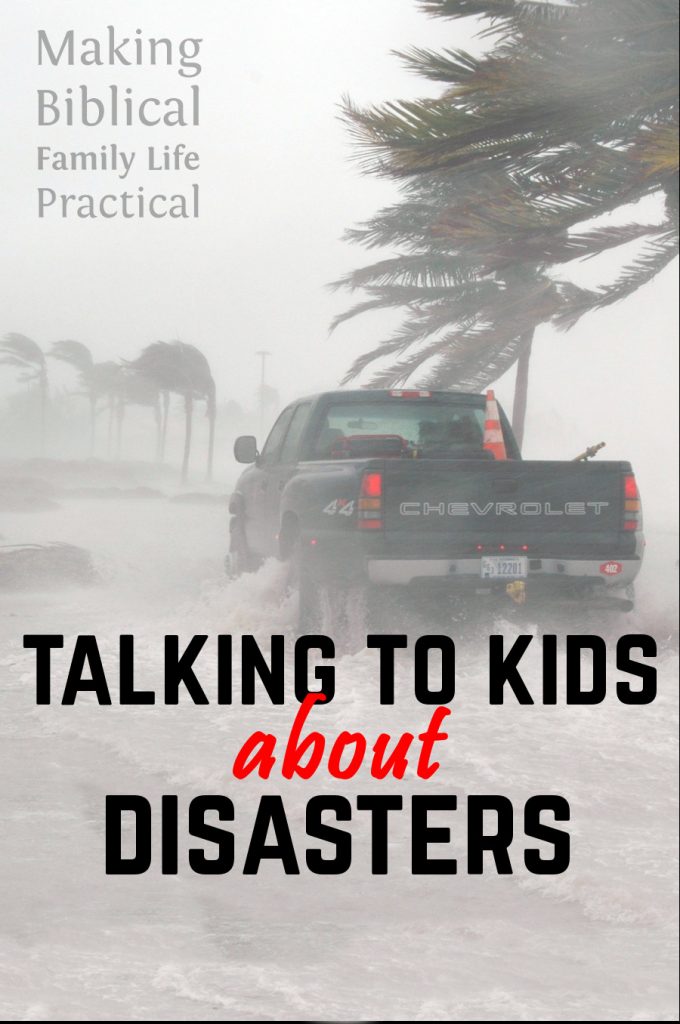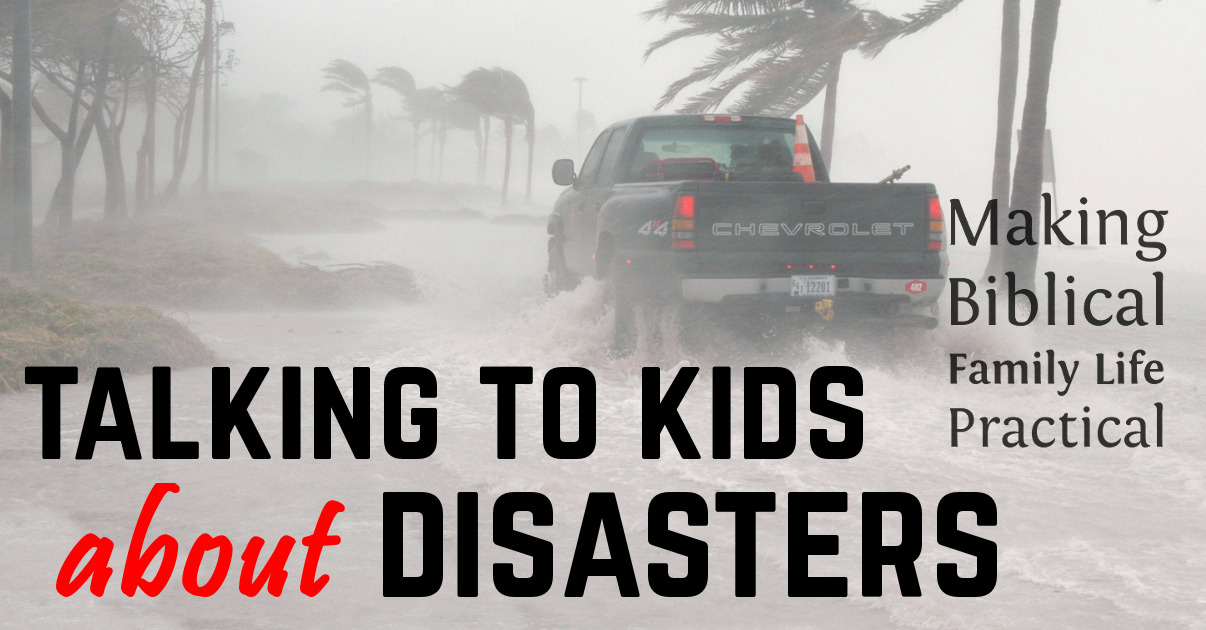Talking to Kids About Disasters
The news is full of alarming stories – hurricanes, flooding, wildfires, and more – and it’s nearly impossible to shield our kids from hearing about it. How do you help your children understand natural disasters and bad news with concern but not panic? Do you talk with your teenagers differently than your young kids? What should we be thinking ourselves?
Give them perspective! Don’t let them fret and worry about tsunamis if you live in the desert, or about outbreaks of tropical diseases if you don’t travel in those areas. We went to Yellowstone National Park once, and warned our children to be very careful not to wander off the walkways – people had fallen into boiling mud pools and had terrible ends! But one of our younger children was so alarmed by the idea, she couldn’t seem to understand that geysers and volcanoes are local events … and not something to worry over back home in North Carolina! Be sure they understand what’s a real and present personal danger – and what isn’t.
Take proper precautions, but give hope. The Proverbs say, “The prudent man sees evil and hides himself …” (Proverbs 22:3) If there is a present danger for you and your family, then it’s appropriate to make preparations – to shelter in place, to be ready to evacuate, or whatever. The important thing is to demonstrate that we are prudent, not panicked. Involve the kids as they’re able. Teenagers are great at stepping up in an emergency. Little kids mostly want reassurance. But be sure to involve your pre-teens however you can – they’re old enough to understand trouble, but too young to do much about it — they think.
Remember that God is in control. He is not surprised by disasters and suffering. We can accidentally worry our children if we make them think that a storm or flood or disease happened in spite of God’s wishes. If God’s plan is overwhelmed by natural events, then how can we trust that He will protect us or take care of us? Instead, the Bible tells us that God controls weather, nature, and natural events, and He directs them both in judgment and in mercy!

| Death and suffering are a result of sin – even for people who didn’t cause it themselves. People will protest, “I can’t believe God made my grandfather sick.” No, sickness comes because this is a fallen world. God doesn’t have to make someone sick – our own weakness does it, or harmful things in the environment, or any of a number of reasons. Sometimes suffering is the fault of someone’s bad choices or sinful behavior – a smoker who gets cancer, a drunk driver who wrecks his car, a homeowner who chose not to evacuate before the hurricane – and God may allow them to experience the results of their sin or foolishness. But at the same time,
We have to be careful not to assume that suffering is always a result of the victim’s sin. In John chapter 9, Jesus encountered a man who was born blind. His disciples asked Him, “Who sinned, this man or his parents, that he was born blind?” And Jesus told them, “Neither this man nor his parent sinned, but that the works of God should be revealed in him.” (John 9:1-3) And then He healed Him! When trouble comes, we can’t blame God, and we shouldn’t automatically assume the victim’s at fault, either. We need to remember that all of us need to repent of our sins and ask God’s forgiveness. When Jesus was asked about an atrocity committed by the Roman occupation, He challenged His hearers, “Do you suppose that these Galileans were worse sinners than all other Galileans, because they suffered such things? I tell you no; but unless you repent, you will all likewise perish. Or those eighteen on whom the tower in Siloam fell and killed them, do you think that they were worse sinners than all other men who dwelt in Jerusalem? I tell you, no; but unless you repent, you will all likewise perish.” (Luke 13:1-5) Whenever we see an accident or hear of a disaster, that is a reminder that one day we all die, and every one of us needs to know and love our Savior. |
Let’s use these opportunities to focus on the simple truths which God clearly says about Himself – that He rules over all the earth and heaven, even in the midst of the storm – that He loves His people enough to die for them – and that even in our worst troubles, God is able to bring good out of the darkness.
Because He promised that … “We know that all things work together for good to those who love God, to those who are the called according to His purpose.” (Romans 8:28)

